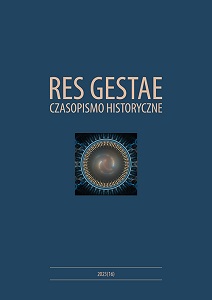Austrian Galicia in the Hungarian Public Discourse of the Interwar Period
Austrian Galicia in the Hungarian Public Discourse of the Interwar Period
Author(s): Róbert BartaSubject(s): Diplomatic history, Political history, Recent History (1900 till today), Interwar Period (1920 - 1939)
Published by: Wydawnictwo Uniwersytetu Komisji Edukacji Narodowej w Krakowie
Keywords: Austria-Hungary; Galicia; Galician Jews; Galician Poles; Horthy Era; Hungarian-Polish relations; Dual Monarchy;
Summary/Abstract: The subject of my article is the image of former Austrian Galicia in Hungarian public discourse in the interwar period, with a focus on two dimensions: the standpoint of the political elite and that of the influential right-wing, revisionist mass-movement; its leaders and intellectuals. The Hungarians, like the Poles, Ukrainians, Ruthenes and Jews of Galicia, had been integral elements of multinational Austria-Hungary. Thus, the first part of the paper deals with the place, role, and character of Galicia in the Dual Monarchy, emphasizing its constitutional status and ethnic and cultural diversity. Because the image of Galicia in the interwar period in Hungary was strongly influenced by the persistent emphasis on the “danger of Galician Jews,” the paper analyses this in detail, stressing the arguments of the two main opinion-making groups mentioned above. In this context it includes the standpoint of the Hungarian Regent, Admiral Miklós Horthy. In addition, the picture of Galicia in Hungary of this time was closely connected to the traditionally strong and well-grounded Hungarian-Polish relationship, so it is necessary to review it, with a concentration on the period between 1938 and 1941. Finally, I give a short summary of aspects of the fate of Galician Jews who stayed in Hungary and who were deported to and massacred in Kamenets Podolsk. The main hypothesis of the paper is that although the image of Galicia in Hungary at the time was characterized by the negative propaganda slogan, the “danger of Galician Jews,” at least until 1941, this was overshadowed by the strong Hungarian wish to keep up and further strengthen the traditionally close Hungarian-Polish friendship. A historical precedent that contributed to this Hungarian-Polish friendship and sense of a common destiny was the role of Austrian-controlled Galicia within the Austro-Hungarian Empire, which, while it did not give the Poles living there the same freedom as the Hungarians within the empire, still contributed to the nation-building of the Galician Poles. Since the Trianon peace treaty gave Poland only a negligible amount of territory and population from historical Hungary (580 km² and 23662 people), the creation of an independent Polish state was a positive development in the eyes of the majority of Hungarians.
Journal: Res Gestae. Czasopismo historyczne.
- Issue Year: 2023
- Issue No: 17
- Page Range: 132-144
- Page Count: 14
- Language: English

